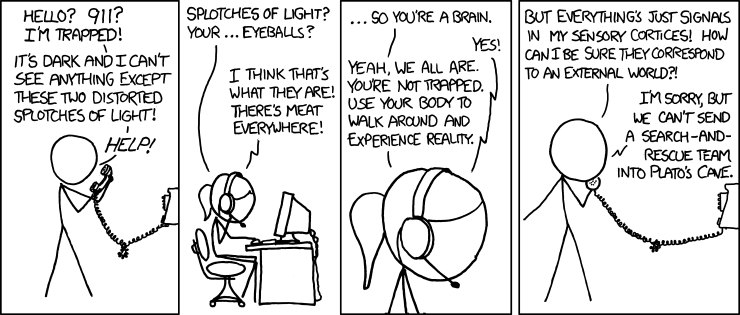I know I just did a comic, but this one was in progress beforehand. Regardless, I think Randall Munroe at xkcd understands:

I’m not much of a fan of philosophy, for several reasons, not the least of which that it can devote considerable time and effort into suppositions or posits that have little bearing on anything at all.
Plato’s Cave refers to a philosophical concept of how nature would be perceived by someone who could only see the shadows of people on the walls of the cave he was within, not the people themselves. It supposes that he would be happy with this, until he found out that the actual world held much more information and detail than he believed, whereupon he would find his former knowledge of mere shadows to be pitiable.
The comic also plays on a related concept, that of solipsism, which states that the only thing we can be sure of is that we exist; all else is perceptions. This is the idea expressed by Descartes when he said, “I think, therefore I am,” as well as the “brain in a vat” scenario: how do we know that we are really human beings experiencing the world, and not simply brains in a vat being fed simulated experiences by wire? How could we prove this?
Now that I’ve impressed everyone with name-dropping and conceptual knowledge, I can proceed to my standpoint on such: whoop de fucking shit. How can we tell? We can’t. So why bother?
The various “Matrix” (or “The Thirteenth Floor“) scenarios, where reality is something much removed from our perception, are fun to watch and contemplate, but they really don’t lead anywhere – they cannot, by nature. We’re a species set apart by our curiosity, our drive to figure out the puzzles and the causes, but scenarios like these can only deny this drive, ultimately petering out in frustration or confusion.
One of the more interesting aspects of philosophy, most especially in Plato’s time, is that it operates on the premise that truth can be divined by meticulous thought and logical debate; experimentation was actually eschewed. This attitude remains today in the occasional denigration of “materialism” and “methodological naturalism,” which underlie what we typical consider the scientific method. The emphasis was on how our minds could tease out the nature of the world without resorting to the physical limitations of the senses – an interesting (and, to my limited knowledge, unintentional) paradox since it failed to recognize the physical limitations of the brain itself. This may have been the fault of either the belief systems of the time, or simply conceit, by thinking that humans held a special place in the hierarchy of life – which also continues today to some extent.
This philosophical concept has been around for 2,500 years or so, and hasn’t really added a whole lot in all that time. Meanwhile, once observation and experimentation caught on, especially the parts where perception was required to be supported independently, our knowledge base expanded hugely. The past 100 years has been incredibly productive, starting to fathom even the workings of the very brain that is supposed to be contemplating the nature of reality. Medicine, astronomy, quantum physics, electromagnetic theory, biology, cosmology, evolution… all owe little to the idea of logical proof.
True, mathematics underlies much of experimentation, and mathematical/logical proof has been around for roughly the same amount of time. But mathematics is a bit hard to consider philosophy, unless you bend the definition to make it indistinguishable from much of anything else. Math, really just relationships between values, isn’t up for discussion and needs no appeal to reason. It’s also an abstract, and its applications to the natural world only approximations.
Science does not rely on proof and cannot – there is no amount of evidence or postulates that can demonstrate the irrevocable nature of something physical. Science relies instead on the weight of the evidence, probability rather than axioms. There are no absolutes. Even so, it still works amazingly well.
It almost certainly bothers some people that we cannot establish any facet of our knowledge beyond all doubt, but this is simply the nature of perception; beyond reasonable doubt, however, is attainable. Seeking perfection or absolutes is a pointless pursuit, but going with what functions dependably works just fine.
As for being a brain in a vat? Well, it’s likely that the beings inducing sensory input that we interpret as the real world get a real kick out of us wasting time contemplating “reality,” so I wouldn’t give them the pleasure, if I were you.
Meanwhile, you still have to relish the phrase, “There’s meat everywhere!”



















































